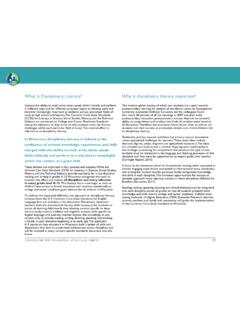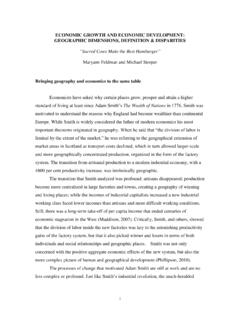Transcription of Stephen’s Guide to the Logical Fallacies
1 Stephen s Guide to the Logical Fallaciesby Stephen DownesOverviewThe point of an argument is to give reasons in support of some conclusion. An argumentcommits a fallacy when the reasons offered do not, in fact, support the fallacy is described in the following format:Name: this is the generally accepted name of the fallacyDefinition: the fallacy is definedExamples: examples of the fallacy are givenProof: the steps needed to prove that the fallacy is committedNote: Please keep in mind that this is a work in progress, and therefore should notbe thought of as complete in any of Distraction False Dilemma: two choices are given when in fact there are three options From Ignorance: because something is not known to be true, it is assumed to be false Slippery Slope: a series of increasingly unacceptable consequences is drawn Complex Question.
2 Two unrelated points are conjoined as a single propositionEach of these Fallacies is characterized by the illegitimate use of a Logical operator in order todistract the reader from the apparent falsity of a certain DilemmaDefinition: A limited number of options (usually two) is given, while in reality there are moreoptions. A false dilemma is an illegitimate use of the "or" :(i) Either you're for me or against me.(ii) America: love it or leave it.(iii) Either support Meech Lake or Quebec will separate.(iv) Every person is either wholly good or wholly Proof: Identify the options given and show (with an example) that there is anadditional option.(Cedarblom and Paulsen: 136)Argument from Ignorance (argumentum ad ignorantiam)Definition: Arguments of this form assume that since something has not been proven false, it istherefore true.
3 Conversely, such an argument may assume that since something has not beenproven true, it is therefore false. (This is a special case of a false dilemma, since it assumes thatall propositions must ether be known to be true or known to be false.) As Davis writes, "Lack ofproof is not proof." (p. 59)Examples:(i) Since you cannot prove that ghosts do not exist, they must exist.(ii) Since scientists cannot prove that global warming will occur, it probably won't.(iii) Fred said that he is smarter than Jill, but he didn't prove it, so it must be Proof: Identify the proposition in question. Argue that it may be true even though wedon't know whether it is or isn't.(Copi and Cohen: 93, Davis: 59)Slippery SlopeDefinition: In order to show that a proposition P is unacceptable, a sequence of increasinglyunacceptable events is shown to follow from P.
4 A slippery slope is an illegitimate use of the"if-then" :(i) If we pass laws against fully-automatic weapons, then it won't be long before we passlaws on all weapons, and then we will begin to restrict other rights, and finally we will endup living in a communist state. Thus, we should not ban fully-automatic weapons.(ii) You should never gamble. Once you start gambling you find it hard to stop. Soon youare spending all your money on gambling, and eventually you will turn to crime to supportyour earnings.(iii) If I make an exception for you then I have to make an exception for Proof: Identify the proposition P being refuted and identify the final event in theseries of events. Then show that this final event need not occur as a consequence of P.(Cedarblom and Paulsen: 137)Complex QuestionDefinition: Two otherwise unrelated points are conjoined and treated as a single reader is expected to accept or reject both together, when in reality one is acceptable whilethe other is not.
5 A complex question is an illegitimate use of the "and" :(i) You should support home education and the God-given right of parents to raise theirchildren according to their own beliefs.(ii) Do you support freedom and the right to bear arms?(iii) Have you stopped using illegal sales practises? (This asks two questions: did you useillegal practises, and did you stop?)Identifying Proof: Identify the two propositions illegitimately conjoined and show that believingone does not mean that you have to believe the other.(Cedarblom and Paulsen: 86, Copi and Cohen: 96)Appeals to Motives in Place of Support Appeal to Force: the reader is persuaded to agree by force Appeal to Pity: the reader is persuaded to agree by sympathy Consequences: the reader is warned of unacceptable consequences Prejudicial Language: value or moral goodness is attached to believing the author Popularity: a proposition is argued to be true because it is widely held to be trueThe Fallacies in this section have in common the practice of appealing to emotions or otherpsychological factors.
6 In this way, they do not provide reasons for to Force ( argumentum ad baculum )Definition: The reader is told that unpleasant consequences will follow if they do not agree withthe :(i) You had better agree that the new company policy is the best bet if you expect to keepyour job.(ii) NAFTA is wrong, and if you don't vote against NAFTA then we will vote you out Proof: Identify the threat and the proposition and argue that thethreat is unrelated to the truth or falsity of the proposition.(Cedarblom and Paulsen: 151, Copi and Cohen: 103)Appeal to Pity (argumentum ad misercordiam)Definition: The reader is told to agree to the proposition because of the pitiful state of the :(i) How can you say that's out? It was so close, and besides, I'm down ten games to two.(ii) We hope you'll accept our recommendations. We spent the last three months workingextra time on Proof: Identify the proposition and the appeal to pity and argue that the pitiful stateof the arguer has nothing to do with the truth of the proposition.
7 (Cedarblom and Paulsen: 151, Copi and Cohen: 103, Davis: 82)Appeal to Consequences (argumentum ad consequentiam)Definition: The author points to the disagreeable consequences of holding a particular belief inorder to show that this belief is :(i) You can't agree that evolution is true, because if it were, then we would be no better thanmonkeys and apes.(ii) You must believe in God, for otherwise life would have no meaning. (Perhaps, but it isequally possible that since life has no meaning that God does not exist.)Identifying Proof: Identify the consequences to and argue that what we want tobe the case does not affect what is in fact the case.(Cedarblom and Paulsen: 100, Davis: 63)Prejudicial LanguageDefinition: Loaded or emotive terms are used to attach value or moral goodness to believing :(i) Right thinking Canadians will agree with me that we should have another free vote oncapital punishment.
8 (ii) A reasonable person would agree that our income statement is too low.(iii) Senator Turner claims that the new tax rate will reduce the deficit. (Here, the use of"claims" implies that what Turner says is false.)(iv) The proposal is likely to be resisted by the bureaucrats on Parliament Hill. (Comparethis to: The proposal is likely to be rejected by officials on Parliament Hill.)Identifying Proof: Identify the prejudicial terms used (eg. "Right thinking Canadians" or "Areasonable person"). Show that disagreeing with the conclusion does not make a person "wrongthinking" or "unreasonable".(Cedarblom and Paulsen: 153, Davis: 62)Appeal to Popularity (argumentum ad populum)Definition: A proposition is held to be true because it is widely held to be true or is held to betrue by some (usually upper crust) sector of the population.
9 This fallacy is sometimes also calledthe "Appeal to Emotion" because emotional appeals often sway the population as a :(i) If you were beautiful, you could live like this, so buy Buty-EZ and become beautiful.(Here, the appeal is to the "beautiful people".)(ii) Polls suggest that the Liberals will form a majority government, so you may as well votefor them.(iii) Everyone knows that the Earth is flat, so why do you persist in your outlandish claims?(Copi and Cohen: 103, Davis: 62)Changing the Subject Attacking the Person:(1) the person's character is attacked(2) the person's circumstances are noted(3) the person does not practice what is preached Appeal to Authority:(1) the authority is not an expert in the field(2) experts in the field disagree(3) the authority was joking, drunk, or in some other way not being serious Anonymous Authority: the authority in question is not named Style Over Substance: the manner in which an argument (or arguer) is presented is felt toaffect the truth of the conclusionThe Fallacies in this section change the subject by discussing the person making the argumentinstead of discussing reasons to believe or disbelieve the conclusion.
10 While on some occasions itis useful to cite authorities, it is almost never appropriate to discuss the person instead of the Person ( argumentum ad hominem )Definition: The person presenting an argument is attacked instead of the argument itself. Thistakes many forms. For example, the person's character, nationality or religion may be , it may be pointed out that a person stands to gain from a favourable outcome. Or,finally, a person may be attacked by association, or by the company he are three major forms of Attacking the Person:(1) ad hominem (abusive): instead of attacking an assertion, the argument attacks the personwho made the assertion.(2) ad hominem (circumstantial): instead of attacking an assertion the author points to therelationship between the person making the assertion and the person's circumstances.(3) ad hominem (tu quoque): this form of attack on the person notes that a person does notpractise what he :(i) You may argue that God doesn't exist, but you are just following a fad.


